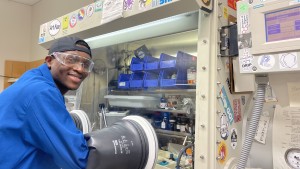Tapiwa Gono Phiri ’25 took a big leap when he left medical school in Zambia to attend Kenyon three years ago. He was excited to study in the United States and run for Kenyon’s track team, but he never would have guessed that his passion would shift from medicine to polymer chemistry.
Gono Phiri is participating in the Summer Science Scholars program the polymer chemistry lab of Yutan Getzler, professor of chemistry and Pamela G. Hollie Chair in Global Challenges. Polymers are very large molecules that make up plastic material, and they are synthesized by linking many smaller building blocks called monomers. Polymer chemistry is becoming more and more relevant with each day that plastic waste enters our landfills and oceans. As plastics break down, they release greenhouse gasses into the atmosphere and microplastics into our waters, impacting both human and animal health.
Getzler’s goal with student research is for scholars like Gono Phiri to gain a deeper understanding of the relationship between the structures of polymers and the way that they behave — specifically how they degrade. Ideally, a polymer could be designed to break down back into its starting monomers and be turned into a new polymer. “This process would ensure that recycled materials have the great properties we value, something often lost with mechanical recycling,” Getzler said.
Captivated by a research presentation, Gono Phiri started working in Getzler’s lab in his first year and has stayed ever since. This summer, Gono Phiri, now a chemistry major, is working with a cheap, widely accessible monomer called epsilon-caprolactone. His goal is to establish a controlled procedure for the reaction that turns this building block into a polymer.
Chemists call this reaction polymerization, and the results of the reaction are impacted by certain conditions, such as the concentration of starting material or the temperature at which the reaction takes place. Gono Phiri is testing to find the conditions of polymerization that can yield a predictable polymer of epsilon-caprolactone every time.
Each work day, Gono Phiri opens the doors to Tomsich Hall, enters the lab, and turns on some country tunes, Zambian music or Afrobeats. Then, he opens his lab notebook, which contains the conditions of each day’s reactions and their results. This will inform what he changes about the reaction the next day. “I enjoy the suspense of trying out things,” Gono Phiri said. “I’ll have a prediction, of course, and then I’ll go, ‘Oh, my prediction was wrong.’” But he always knows that the next day, he can try again.
Gono Phiri’s tests take place in a glove box that protects materials that are sensitive to any oxygen or moisture in the environment. He inserts his hands into two thick rubber gloves that are attached to the container, and he can set up each reaction that way. Though the gloves limit his dexterity, no obstacle can diminish his excitement for each new reaction.
“This is a time when I’m discovering how much I love being in the lab,” said Gono Phiri, who is excited for one more year of running track and synthesizing polymers in Gambier. After graduation, he plans on entering a PhD program in polymer chemistry, ready to shape the future of materials made from polymers.
This article was written by Hannah Ehrlich ’26 as part of the Hoskins Frame Summer Science Writing Scholars program.
